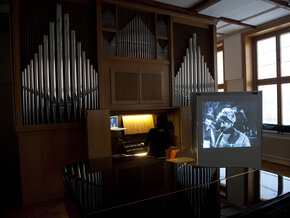- Study at the MUK
- Faculty of Music
- Faculty of Performing Arts
- Pedagogical Study Programmes
- Doctoral Programme
- Training Courses/Academic Diploma Courses
- International study programmes
- Co-registration
- Student Admissions Office
- Lecturers
Artistic-scholarly research at the MUK
Artistic-scholarly research begins with one or more specific research questions and positions itself with or innovatively differentiates itself from other (research) approaches when investigating these questions. Through artistic reflection, these questions can also be relevant for other scientific fields and society as a whole (Borgdorff 2012, 81—85; Borgdorff 2012b, 161—165)1. The research questions are based on relevant theoretical discourses and informed by state-of-the-art knowledge.
Moreover, artistic-scholarly research is characterised by a systematic, transparent and repeatable method. Besides the (subjectively) experienced insights of the researchers, the process that led to these insights and, above all, their reflection, is essential in artistic-scholarly research processes. The research methods and forms of documentation are determined by the object of research or the specific focus of interest. They may be newly developed for a specific project or borrowed from another discipline. In terms of quality assurance, artistic-scholarly research strives for the international standards of good research practice: repeatability, verifiability and justification or argumentability of hypotheses through evidence (AEC 2015, 3)2. These standards also apply to the BA, MA and doctoral dissertations at the MUK, which are, in principle, located in the field of artistic-scholarly research.
Artistic practice plays a central role in artistic-scholarly research. Often, the medium of the “stage” becomes a research laboratory for this purpose (Badura 2015, 24)3. The knowledge generated in and through exploratory artistic practice could not have been gained through historical or systematic analyses alone. The knowledge gained through artistic practice correlates with the researcher’s critical theoretical reflection during the preparation, implementation and follow-up of the artistic-scholarly research project. This necessary correlation often leads to a transdisciplinary orientation of artistic-scholarly research, e.g. through the inclusion of the humanities, social sciences, natural sciences and/or various artistic practices (Peters 2017, 25)4. The transdisciplinary character of artistic-scholarly research becomes also evident through interdisciplinary research groups consisting of artists and scientists. Artistic-scholarly research usually has a processual character.
The critical reflection of the results and methods is also essential for artistic-scholarly research, its documentation and publication. The performance or presentation of an artistic project is usually considered insufficient as the sole publication of research results (AEC 2015, 5).In terms of the Austrian Science Fund FWF, however, publications in the field of artistic-scholarly research are not limited to the written word; they can also include other, potentially experimental forms and formats of presentation and knowledge transfer.
Current artistic-scholarly research projects
__________________________________________________________________________
1 Borgdorff, Henk (2012): Künstlerische Forschung und akademische Forschung. In: Kunstforschung als ästhetische Wissenschaft. Beiträge zur transdisziplinären Hybridisierung von Wissenschaft und Kunst. Edited by Martin Tröndle and Julia Warmers. Berlin: transcript, 69—89.
2 AEC (ed.) (2015): AEC Key Concepts for AEC Members: Artistic Research — Künstlerische Forschung. “White paper” of the AEC Council. [31.1.2020].
3 Badura, Jens (2015): Darstellende Künste. In: Künstlerische Forschung. Ein Handbuch. Edited by Jens Badura et al. Zürich, Berlin: Diaphanes, 23—25.
4 Peters, Deniz (2017): Six Propositions on Artistic Research. In: Perspectives on Artistic Research in Music. Edited by Robert Burke and Andrys Onsman. Lanham: Lexington, 19—26.



